Implementing motivational rewards for employees
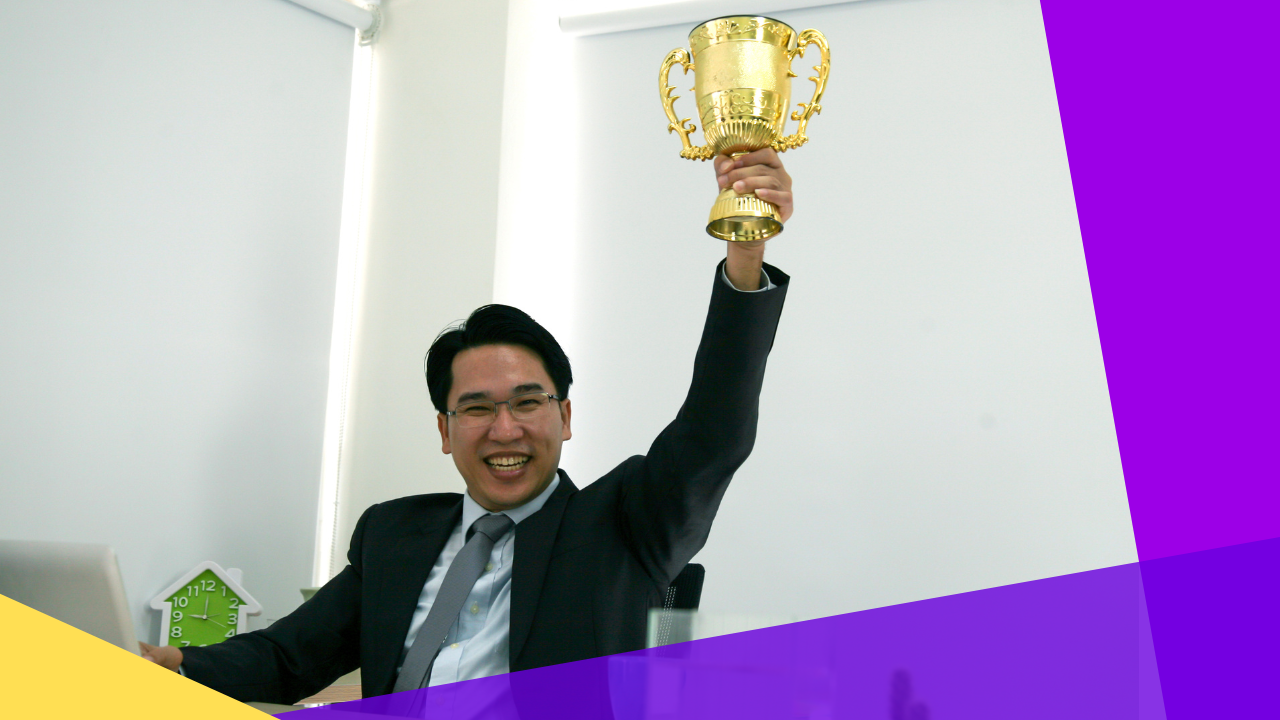
People usually have something that forces them behind their actions. It can be an aesthetic morning routine, a cardio workout, or an exciting event to look forward to at the end of a long workday.
If these little things can do wonders to motivate a person, what more can motivational rewards for employees do?
A human motivation theory suggests that activities are usually driven by the desire to receive positive feedback from others. One of the main theories of motivation, the incentive theory, states that the desire for rewards or reinforcement drives action.
This practice is also applicable for remote workers, like those you can find with Remote Employee.
What are the types of employee rewards system
There are several ways how to reward employees, but here are four incentive systems that employers can implement to help motivate a team:
Monetary
A bonus-based incentive system is designed based on monetary rewards. Giving employees a bonus can encourage them to work hard and deserve it.
Bonuses may be awarded quarterly, every six months, or by the end of the year.
Employees who are motivated by money perform best under this type of reward structure. If getting the bonus is made to be a friendly competition, it can also aid in strengthening the bonds within the team.
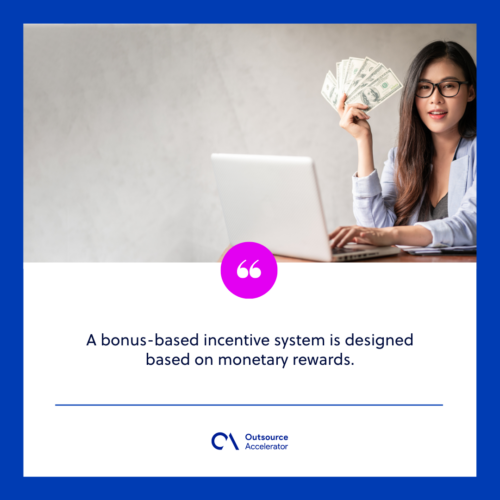
Non-monetary
A non-monetary rewards system may inspire teams that favor benefits over bonuses, as they have something to gain from a system like this.
For instance, if they were the best performer in their department, they may receive a small award or bonus. This could motivate others to produce additional work, which would aid in projects finishing on time or ahead of schedule.
Other non-cash incentives that can be used to motivate staff members of the organization include catering for lunch, possibility to leave work early, work remotely, and flexible working hours.
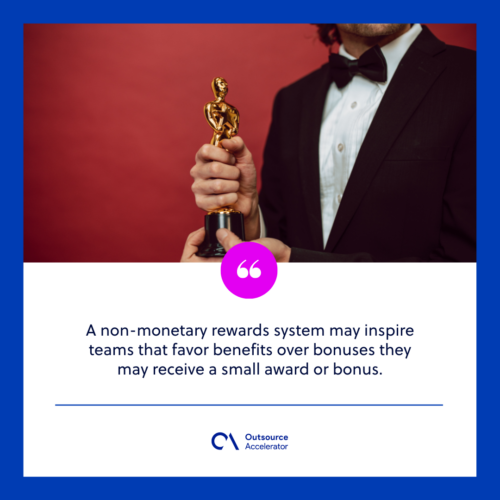
Assistance
Employers can also help staff members maintain a healthy work-life balance by offering services that improve their physical and emotional well-being.
This program might aid the employees in having more focused minds and healthier bodies, which can enhance their work performance.
Assistance programs, though not a typical incentive, can make workers feel appreciated and supported.
The benefits of this rewards system may include discounts on local health services like spa visits or gym memberships, visits from mental health specialists on-site, and sessions on how to deal with stress, bereavement, and other difficulties.
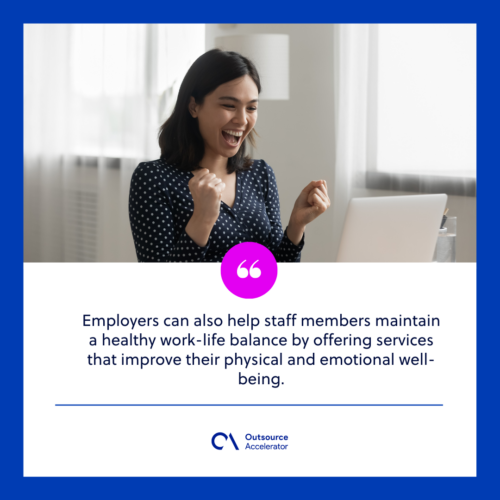
Recognition
Sharing an employee’s accomplishments with the rest of the company is the goal of a recognition rewards scheme.
This can be implemented through a celebration for the employee of the month or an awards ceremony at the end of the year.
By doing this, the team can be motivated to put in more effort for recognition of their efforts.
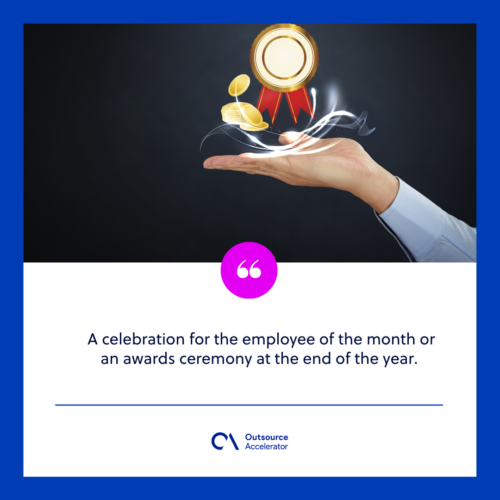
The role of motivational rewards for employees
The desire for rewards or reinforcement is deemed human nature, and so motivational rewards for employees are a great tool to bring out the best in the employees.
Here are some of the favorable results of motivational rewards:
Productivity
In an organization, rewarding employees is crucial since it motivates them to put in more effort and be more productive.
People work more when they know they are being appreciated, and research backs it up. It says that employee participation in reward programs is at 52% in 2022.
The significance of a reward system to boost motivation is growing even more as the younger generations join the workforce.
While these young workers desire fair pay and benefits, they also want meaningful and fulfilling employment. Recognizing a job well done, or more especially receiving regular compliments and rewards for their efforts, contributes to the meaning of work.
Happier employees
The majority of employers genuinely care about their employees’ happiness and well-being. After all, satisfied workers are frequently productive workers, and content workers boost morale.
Morale is strong when turnover is low, and the company has a better chance of succeeding and achieving its revenue goals.
Rewards play a crucial role in retaining employees’ happiness and productivity. Motivational rewards and employee happiness are directly related. Workers feel better and more proud when they receive recognition which also increases the level of their job satisfaction.
Recognition increases trust
Employee appreciation also boosts workplace trust, which is important for motivation and keeping workers happy.
People want to know that their efforts are having an impact and that senior officials are paying attention. Employee recognition and rewards foster better bonds among them, which increases motivation.
Rewards are better than punishment.
It would seem to follow that punishment, or the prospect of punishment may be just as effective as rewards if they are such strong motivators.
Nobody wants to feel pain, whether it be psychological suffering brought on by being embarrassed, demoted, or even fired or genuine physical pain.
Thus, rewards are much more powerful than punishment in inspiring people to take action. The threat of penalty only works better when trying to discourage employees from doing something (e.g. using corporate resources for a personal cause).
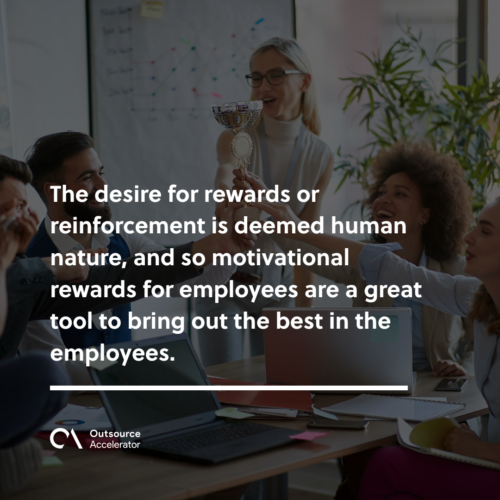
How to implement an employee motivational rewards system
Implementing an employee motivational rewards system does not have to be complicated. There are just some things that need to be considered to make sure that it’ll run smoothly.
Here are a few tips for implementing motivational rewards for employees:
Ask for the employees’ preference
If unsure, it is always a good idea to ask the employees what sort of reward or incentive they want to receive.
It can be helpful to find out directly from them what inspires them when deciding which reward system to implement.
The awards should be reasonable.
It is important to create a reasonable compensation structure for workers if they should help sustain the business.
Sometimes, it is better to offer them monetary compensation by the end of the month during a busy season instead of offering a day off work.
Consider group rewards
If the organization has resources, group prizes or team rewards can also be offered. For large teams, they may need to be divided into more manageable task groups, and the group or groups that deliver the best work get rewarded.
Ask for feedback
After the incentives system has been in place for a while, it would also be nice to ask the staff members what they think of it.
Use their opinion to make any necessary adjustments.
Rotate the type of reward system from time to time
Rotating the type of reward system in place, whether weekly, monthly, or yearly, may help to keep team members engaged and motivated.
As an additional incentive, the weekly praise system can be replaced with a monetary payment during the holidays.







 Independent
Independent




